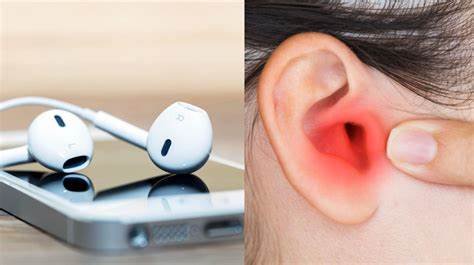Headphones have become an essential part of modern life, whether for music, calls, or meetings. However, The Risks of Long-Term Headphone Use can lead to serious health issues, such as hearing loss, ear infections, and tinnitus. How damaging can long-term headphone use be? More importantly, how can you protect your ears while still enjoying your favorite sounds? Let’s explore.
The Risks of Long-Term Headphone Use

Listening to headphones at high volumes or for extended periods can damage the tiny hair cells in your cochlea, leading to irreversible hearing loss. Research shows that exposure to sound levels above 85 decibels significantly increases this risk. Unfortunately, many users unknowingly push their headphone volumes higher, especially in noisy environments, worsening the damage.
Earbud-style headphones are particularly risky as they sit directly in the ear canal. This positioning amplifies sound pressure and can trap moisture, creating a breeding ground for bacteria. Without regular cleaning, headphones can transfer dirt and bacteria into the ear, leading to infections or inflammation.
Additionally, prolonged use can overstimulate the auditory nerves, potentially causing tinnitus—a persistent ringing or buzzing in the ears. Left untreated, this can greatly impact daily life.
Types of ear protection to protect your ear: Types of Ear Protection
How to Protect Your Hearing Health from The Risks of Long-Term Headphone Use

Thankfully, there are effective ways to minimize these risks:
Control Volume and Listening Time
Keep your headphone volume at no more than 60% of the maximum level. Limit listening sessions to an hour at a time, followed by a 10-minute break to let your ears recover.
Choose the Right Headphones
Over-ear headphones are generally safer than earbuds as they reduce the need for high volume by offering better noise isolation. They also exert less physical pressure on your ear canal.
Maintain Hygiene
Clean your headphones regularly with alcohol wipes and replace ear tips when necessary. Ensure your ears stay dry and free of buildup to avoid infections.
Pay Attention to Warning Signs
If you experience symptoms like tinnitus, ear pain, or muffled hearing, stop using headphones and seek medical advice immediately. Early intervention can prevent further damage.
Conclusion: The Risks of Long-Term Headphone Use
Headphones may be convenient, but improper use can pose serious threats to your hearing. By keeping volumes low, taking breaks, choosing better headphones, and maintaining hygiene, you can protect your ears from damage. Don’t let headphones become the silent threat to your hearing health—take the necessary steps today to enjoy both sound and safety.
